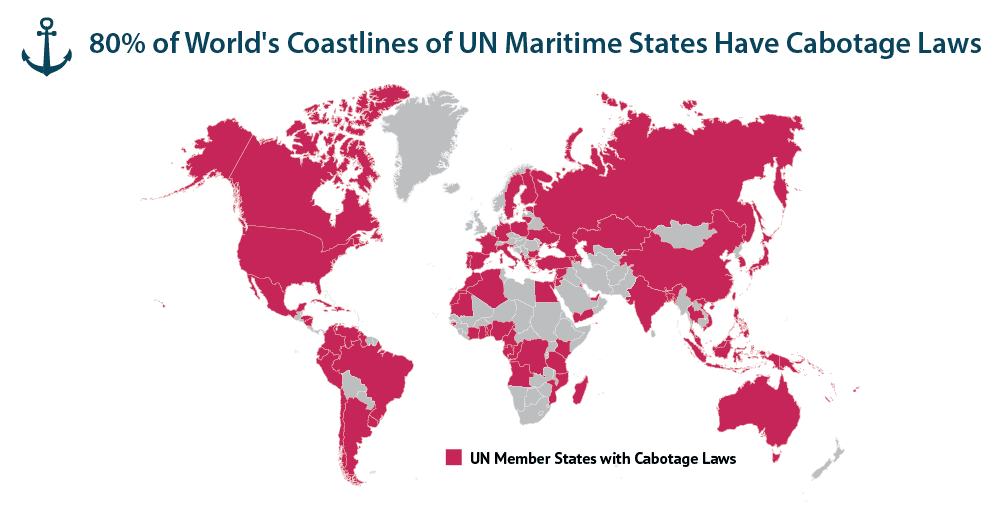Comprehensive Study Provides Policymakers with Fact-Based Insights into Global Governance of Domestic Maritime Trades for First Time
WASHINGTON (September 25, 2018) – Seafarers’ Rights International (SRI), a leading international research center on maritime and seafarers’ law, today released a new report – Cabotage Laws of the World – finding that 80% of the world’s coastlines of United Nations (UN) maritime states have in place laws governing foreign maritime activity in domestic coastal trades – otherwise known as cabotage laws.
The International Transport Workers’ Federation (ITF) commissioned this report given the lack of a recent, comprehensive accounting of maritime cabotage laws around the world, which was an impediment to thoughtful policy-making and fact-based decision-making.
Through an exploration of the nature and extent of cabotage laws around the world using input from practicing lawyers in 140 UN member states, SRI described the historical utilization, prevalence and importance of cabotage laws globally by confirming the existence of cabotage laws in 91 UN member states.
Findings highlight the historical origins of maritime cabotage, dating back to early rudimentary legal principles, and illustrate examples of the many different definitions of cabotage that exist at the national, regional and international levels designed to advance individual nation’s economic, national security, human capital and homeland security interests.
“For many people maritime cabotage, or coasting, coastwise or coastal trade as it is sometimes referred to, is understood, if at all, only vaguely. This is not surprising since so little is published on the subject,” explains Deirdre Fitzpatrick, Executive Director of SRI. “This was a complex project, given language and cultural barriers and difficulties in statutory interpretations. But the subject is important. It affects a very wide range of trades, services and activities around the world, and with significant social and economic consequences. Policy makers especially need to know more about the subject”.
Key findings of the study include:
- Cabotage is “widespread” – 91 member states and eighty percent of the world’s coastlines of UN maritime states have cabotage laws
- Cabotage policy objectives are diverse and designed to: maintain national security, promote fair competition, develop human capacity, create jobs, promote ship ownership, increase safety and security of ships in port, enhance marine environmental protection and preserve maritime knowledge and technology
- Cabotage exists in every region of the world, and in a diversity of political, economical and legal systems
- Cabotage laws have endured in some countries for centuries
In the United States, cabotage laws that govern the transportation of goods and people between domestic ports are commonly referred to as the “Jones Act,” an essential maritime law that requires movements of goods and people be on vessels that are U.S.-flagged, U.S.-crewed, U.S.-built and U.S.-owned. This comprehensive study of UN members’ maritime policies and cabotage requirements can further inform policymaking in a fact-based manner.
“The United States is, and always has been, a maritime nation. From the very founding of our country, the American maritime industry has served a critical role in maintaining our national, homeland and economic security,” said Matt Woodruff, Chairman of the American Maritime Partnership. “For policymakers that work to promote a strong and vibrant economy and national security leaders charged with protecting the U.S. security posture, this comprehensive study reinforces the importance of cabotage laws – like the Jones Act – and the historical legislative actions taken to support maritime industries across the globe, including in nations like Russia, China and South Korea.”
This report, commissioned by the ITF engaged professional laws firms in 140 United Nations member states. A full copy of the report published by SRI is available at www.seafarersrights.org/seafarers-subjects/cabotage/
# # #
American Maritime Partnership (AMP) is the voice of the U.S. domestic maritime industry, a pillar of our nation‘s economic, national, and homeland security. More than 40,000 American vessels built in American shipyards,crewed by American mariners,and owned by American companies, operate in our waters 24/7, and this commerce sustains nearly 500,000 American jobs, $29 billion in labor compensation, and more than $100 billion in annual economic output. For more information about AMP, please visit www.americanmaritimepartnership.com.
Seafarers’ Rights International (SRI) conducts independent research on maritime and seafarers’ law under the guidance of a pan-industry Advisory Board consisting of judges, professors, lawyers and maritime industry representatives from around the world.
Deirdre Fitzpatrick, Executive Director of SRI set up the organization in September 2010, in response to the need for the fair protection of seafarers in national and international laws. A Solicitor of the Supreme Court of England and Wales, she joined the International Transport Workers’ Federation in 1994 and headed up its legal services department until she left in 2010. She has considerable experience in the protection and enforcement of seafarers’ legal rights and is co-editor of ‘Seafarers’ Rights’, published by Oxford University Press.
The International Transport Workers’ Federation (ITF) creates borderless solidarity among transport workers in every corner of the globe. We support 670 affiliate trade unions in 140 countries, representing 19.7 million workers.



Comments are closed.